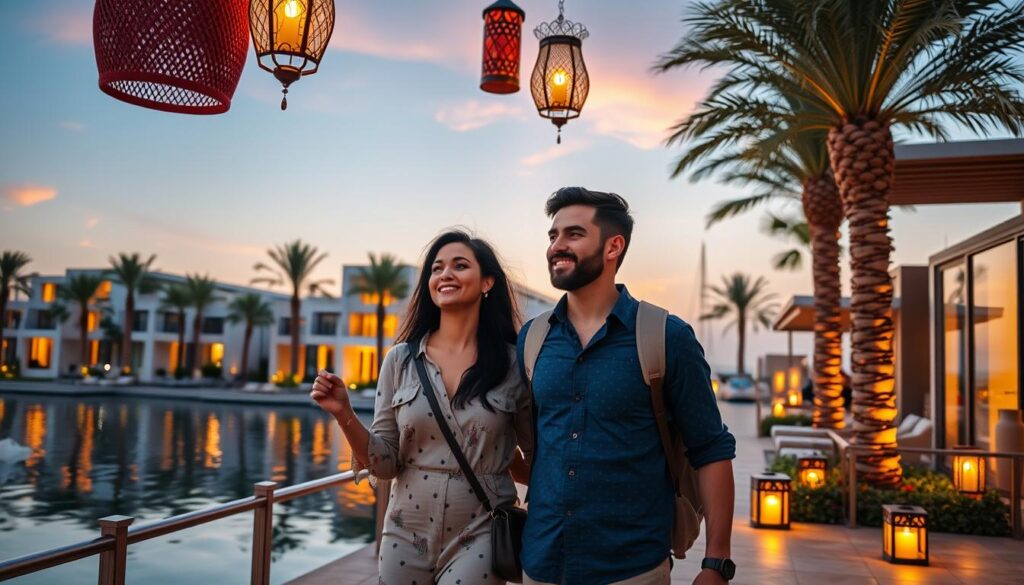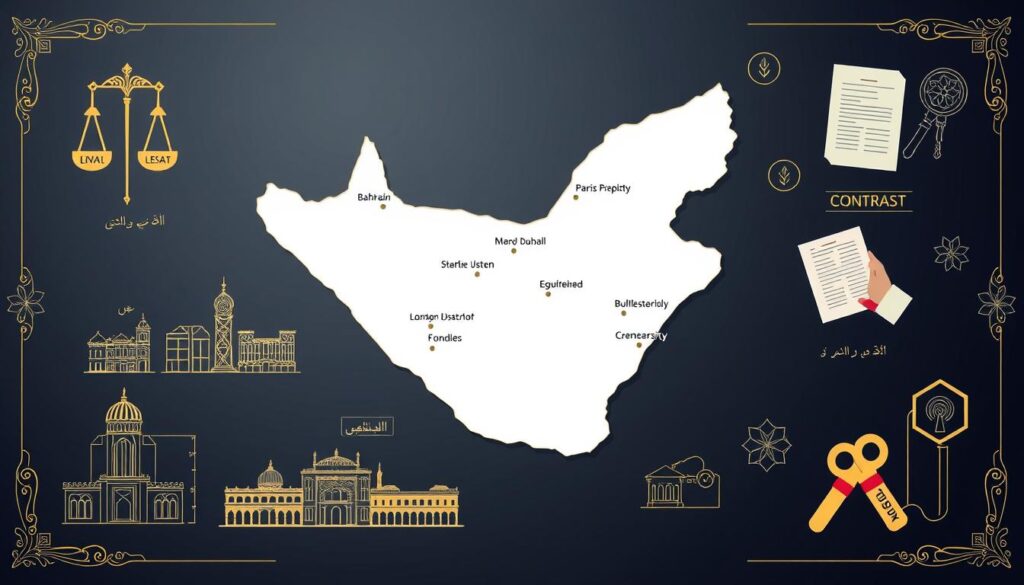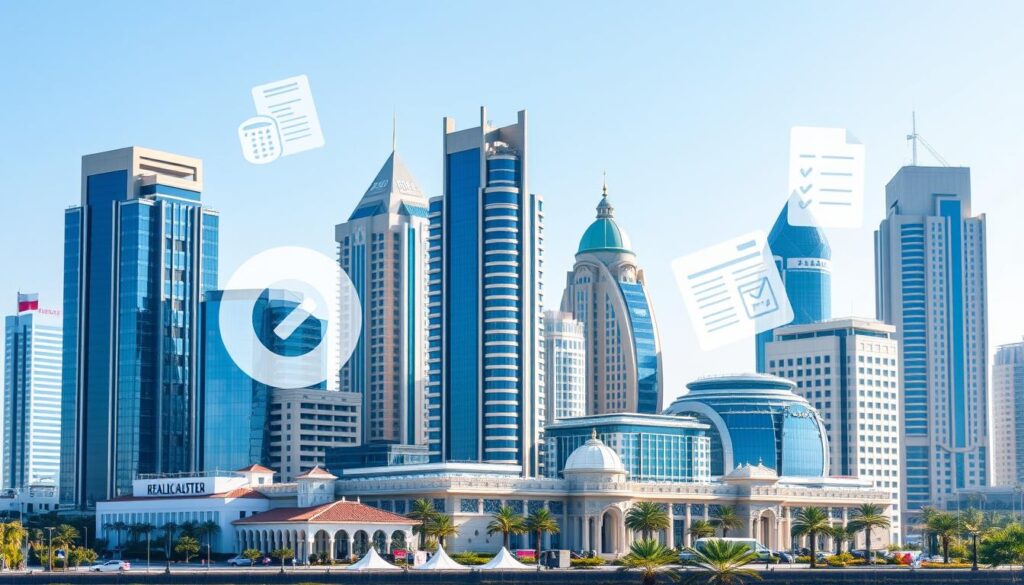Bahrain’s captivating landscapes and vibrant cultural scene have established it as an attractive destination for foreign real estate investors. The nuances of foreign ownership of property in Bahrain are defined by the designated freehold areas that facilitate luxury living. Intriguingly, foreign nationals can acquire property without necessarily obtaining residency, which offers flexibility for investment or occasional use. For non-GCC nationals, however, residency can be facilitated through property investment, although this does not equate to citizenship.
For those interested in diving into the Bahrain real estate for non-Bahraini residents, it is crucial to gather a property pack for comprehensive market analysis. This kind of pack offers essential insights into Bahrain’s flourishing economy, robust rental yields, and the lifestyle of expatriates in Bahrain. Investors in the Bahraini property market can thus make well-informed decisions, aligning their investment strategies with the growth trends observed in freehold property zones.
Key Takeaways: How to Buy a Property in Bahrain
- The property market in Bahrain is open to foreign investors, particularly in designated freehold areas.
- Foreign ownership of property in Bahrain does not require residency, but residency can be obtained through property investment.
- Investment in Bahrain’s property market is driven by lucrative rental yields and robust economic growth.
- A detailed property pack can provide vital data on the Bahrain real estate market and expatriate lifestyle.
- Designated freehold zones are developed for luxury living, offering a diverse range of investment opportunities.
For a detailed guide on the steps and costs involved in buying property as a foreigner, potential investors can refer to this comprehensive resource. The Gross Domestic Product (GDP) per capita in Bahrain has risen by 6.0% over the last five years, indicating a promising surge in real estate demand1. Additionally, gross rental yields for residential properties range between 8.3% and 11.0%, offering substantial returns on investments1.
Contact us if you are Interested in Buying Property Abroad!
Introduction to Bahrain’s Property Market
Bahrain’s property market is a vibrant blend of traditional and cosmopolitan living, which caters to a diverse expat community. The Bahrain property market insights show that the government’s proactive stance on foreign investments has significantly contributed to this sector. Initiatives such as regulatory reforms, infrastructure projects, and incentives for international investors have played a pivotal role in the market’s development2.
One of the critical aspects of Real Estate Regulations for Expats in Bahrain includes the establishment of the Real Estate Regulatory Authority (RERA) in 2017, which has enhanced transparency and standardization in property transactions and management, thereby attracting global investors3. This makes Bahrain’s real estate market relatively more open to foreign investment compared to other GCC countries3.
The property market offers a wide range of investment opportunities in Bahrain real estate across various types of properties such as residential, commercial, and mixed-use developments. Popular freehold zones like Juffair, Amwaj Islands, Durrat Al Bahrain, and parts of Seef are particularly attractive to expatriates3. Expats are drawn to these zones due to the high quality of life, modern infrastructure, and the availability of chic apartments and luxury waterfront properties3.
Additionally, Bahrain’s real estate sector is supported by a robust financial infrastructure. Numerous banks and financial institutions provide mortgage loans to both nationals and expatriates, which makes financing options accessible for a broader audience3. The lack of property taxes further sweetens the deal for foreign investors, although other expenses such as registration fees, agency fees, and service charges need to be considered3.
Bahrain’s economic stability amidst global uncertainties also underscores the attractiveness of its property market2. With ongoing infrastructure developments such as the Bahrain International Airport expansion and the Bahrain Metro project enhancing connectivity, strategic locations are becoming more attractive for real estate investments2.
The continuous focus on sustainable development practices and integration of technology in real estate operations are also in line with global trends, making Bahrain’s market contemporary and competitive2. Investment opportunities in Bahrain real estate are further supported by liberal investment policies and tax incentives, attracting both local and international investors2.
Understanding the legal framework, including property ownership laws and restrictions, is crucial for international buyers. Typically, residency is granted for property purchases above BHD 50,000, which is an appealing aspect for many expatriates looking to permanently settle or invest in Bahrain buying property in Bahrain as an international3.
In conclusion, Bahrain’s property market presents a plethora of investment opportunities with a supportive legal framework and a thriving economic environment. Investors and buyers would benefit from understanding the unique aspects of Real Estate Regulations for Expats in Bahrain to navigate this dynamic market successfully.
Can Foreigners buy Real Estate in Bahrain

Yes, foreigners can indeed purchase real estate in Bahrain. The Bahraini government has designated certain high-end areas for foreign ownership, making Bahrain freehold property investment an attractive option for international buyers. Popular locations for Non-Bahraini nationals buying property in Bahrain include Amwaj Islands, Juffair, Seef, and Riffa4. By purchasing real estate in Bahrain as a foreigner, individuals can also apply for a Self-Sponsorship Residence Permit, valid for five years and extendable upon request5.
While the process of purchasing real estate in Bahrain as a foreigner may involve additional paperwork compared to Bahraini nationals, there are no preset minimum investment requirements. This means expats can acquire property even with relatively modest investments. However, foreigners looking to obtain a residence permit by purchasing property in Bahrain must ensure the property value is at least 50,000 BHD5.
Bahrain remains one of the only Gulf countries allowing 100% foreign ownership, which adds to its appeal for real estate investors5. However, it is worth noting that some areas remain restricted to Bahraini nationals, emphasizing the importance of legal consultation to navigate these regulations effectively4. To facilitate a smooth transaction, it is recommended for foreign buyers to engage reputable property lawyers, who can be found through the Bahrain Bar Association4.
Foreigners investing in Bahrain’s real estate market are often drawn by the variety of property types available, including apartments, villas, townhouses, and commercial properties4. Additionally, the Bahraini property market is influenced by trends such as luxury developments, eco-friendly properties, and the popularity of short-term rentals, which offer diverse opportunities for investment4. For those purchasing property through a company in Bahrain, there may also be potential benefits for investment and tax planning4.
Legal Framework and Eligibility Requirements

The Bahraini government has established a comprehensive legal framework to regulate foreign ownership of property, particularly aimed at ensuring national security and public order. Bahraini nationals can purchase property anywhere in the country without restrictions, while foreigners can only buy property in designated freehold areas like Amwaj Islands, Juffair, and Seef. Foreigners can also lease property for up to 99 years in areas outside designated freehold zones6.
Foreign Ownership Legislation
Law No. 27 of 2017 stipulates the Bahrain real estate legal framework, replacing previous regulations such as Legislative Decree No. 21 of 1976 and Law No. 28 of 2014. This law established the Real Property Organization to oversee and regulate the property sector comprehensively7. Foreign investors must register property transactions with the Survey and Land Registration Bureau (SLRB) and comply with all local regulations, including paying any applicable fees and maintaining their property in good condition6.
The legal guidelines for foreigners buying property in Bahrain ensure a structured process that aligns with national interests. The Property Regulation Organization is tasked with executing a national plan for regulating the real estate sector, including property development, property brokers, property valuation, and property management7.
Residency and Self-Sponsorship
Foreign investors who purchase property above a certain value are eligible for residency via property investment in Bahrain, gaining self-sponsorship residency permits that can be renewed. This residency scheme is a significant incentive for foreign investors, contributing positively to Bahrain’s real estate market’s dynamic nature6. It is highly recommended that foreigners engage a local lawyer familiar with Bahrain’s property laws to ensure a smooth transaction process and full compliance with the Bahrain real estate legal framework.
Further information on foreign investment regulations in Bahrain can be found through legal guidelines for foreigners buying property in.
Designated Freehold Areas for Foreign Property Ownership

Foreign property ownership in Bahrain is concentrated in select zones that allow expatriates to enjoy full ownership rights. These designated Bahrain freehold property zones offer luxurious living spaces and high-end commercial opportunities, fostering significant Foreign Investment in Bahrain Real Estate.
Popular Freehold Zones
The popular freehold zones in Bahrain where foreign property ownership is permitted include Amwaj Islands, Juffair, and Seef8. These areas provide not only high-status residential communities but also a robust infrastructure for businesses. Notably, expatriates can only purchase property in specific sectors unlike Bahraini nationals who can buy property anywhere in the country8. Beyond offering Foreign Investment in Bahrain Real Estate, these areas facilitate foreign investors with residential permits upon property investment, with benefits extending to their immediate families9. Furthermore, the low tax rates and excellent connectivity by air, sea, and land, make Bahrain highly attractive to international buyers9.
Understanding Freehold and Leasehold Properties
Grasping the distinction between leasehold vs. freehold property in Bahrain is crucial for potential foreign investors. Freehold properties offer perpetual ownership rights, including the ability to use, lease, and sell the property at will. These rights are reserved specifically for designated freehold areas like Amwaj Islands, Juffair, and Seef6. On the other hand, leasehold properties grant possession for a specified term, usually up to 99 years, and these are typically available in areas outside of the approved freehold zones for foreigners6. This nuanced understanding can aid in making informed investment decisions, ensuring a seamless and profitable venture into Bahrain’s real estate market9.
Contact us if you are Interested in Buying Property Abroad!
The Buying Process for Foreigners in Bahrain

Buying Property as a Non-Bahraini Resident can be a rewarding endeavor, but it’s crucial to understand the specific steps and documentation needed. This section outlines the essential steps and required documents involved in the process of purchasing property in Bahrain.
Steps Involved in Purchasing Property
The steps to purchasing property in Bahrain begin with selecting a property in designated freehold areas. Foreigners can buy land in specific zones such as Amwaj Islands, Bahrain Bay, and Diyar Al Muharraq as detailed here10. Next, negotiating and agreeing on the purchase price is key, followed by signing a reservation agreement with the seller.
The buyer must then sign a sales agreement, which a notary public must notarize to ensure the transaction’s legality. Upon completion of the sales agreement, the buyer should register the property with the Survey and Land Registration Bureau to obtain a title deed. The transfer fees for title deeds in Bahrain are generally 2% of the purchase price, with a reduced fee of 1.7% available if paid within 60 days of registration11.
Required Documentation
For a smooth transaction, it’s essential to have all the necessary documentation ready. Foreign buyers must provide identification documents like passports and residence permits. Additionally, a proof of address, a copy of the reservation agreement, and the notarized sales agreement are required. Consulting with local experts to conduct title searches and secure any needed approvals from the Survey and Land Registration Bureau and relevant authorities is highly recommended to avoid complications.
Residency options tied to property ownership can also be considered. Non-Bahraini residents need to ensure that their property meets the investment criteria, such as owning property worth at least BHD 50,000 and complying with health insurance requirements to be eligible for a residence permit, which can be renewable every 2 to 5 years11.
Taxes and Fees for Foreign Property Owners

Purchasing property in Bahrain as a foreigner requires understanding the associated taxes and fees. While Bahrain does not levy property taxes on residents and non-residents, there are other financial considerations to keep in mind like registration and stamp duty fees12.
Municipal Tax
Foreign property owners in Bahrain are required to pay a municipal tax of 10% on the rental value of their properties, applicable to both commercial and residential properties. This tax is primarily levied on expatriates, adding to the considerations when planning for Bahrain property taxes for foreigners13.
Attorney and Agent Fees
In addition to municipal tax, there are significant real estate attorney fees in Bahrain associated with property transactions. Notary fees in Bahrain cost approximately $40, paid by the buyer, and the registration fee is 2% of the property value, also borne by the buyer12. Real estate agent fees typically range from 1% to 5% of the property’s value and are generally paid by the seller12. It is advisable to consult with local professionals to navigate these expenses effectively and ensure compliance with all legal obligations12.
While Bahrain’s property market, worth over $6 billion, has robust investment opportunities, it is essential for foreign investors to account for the various financial obligations12.
Benefits of Buying Property in Bahrain

Investing in real estate in Bahrain offers numerous advantages, contributing to its reputation as a favorable investment destination. The advantages of Bahrain real estate investment are manifold, starting with the possibility of high rental yields, especially in popular districts like Juffair, Seef, and Busaiteen, where annual rental returns range between 10-12%14. The country’s strategic geographical position and robust economic stability further establish Bahrain as an attractive hub for business and expatriate living.
One significant benefit of property ownership in Bahrain is the tax-friendly environment it provides. Both individual investors and businesses can take advantage of potential tax incentives, making the investment climate more appealing. Furthermore, the transparent property laws overseen by the Survey and Land Registration Bureau enhance investor confidence in ownership rights15. Legal assistance from reputable real estate lawyers is crucial in navigating the procedures, ensuring proper due diligence, and verifying property ownership15.
The growth in Bahrain’s construction sector reflects positively on real estate investments. An 11% increase in construction permits year-on-year during the first eight months, with 7,447 projects worth a total of BHD 1.3 billion approved, signifies a thriving market14. Additionally, property prices in Bahrain are on the rise, particularly in freehold areas, underscoring a strong demand14. This trend suggests a favorable return on investment for potential buyers.
The country’s diverse and inclusive expatriate community highlights another benefit of property ownership. Bahrain ranked 9th among the best countries for expats to work and live, further boosting its attractiveness14. This ranking reflects an environment conducive to extended living, business opportunities, and community engagement. Moreover, real estate investors can benefit from modern infrastructure, luxurious lifestyle options, and a supportive legal framework aimed at encouraging foreign investment in the property market.
Investors can explore various popular areas for real estate investments in Bahrain, such as Muharraq, Manama, Seef, Amwaj Islands, Hoora, Durrat, Diyar Al Muharraq, Janabiyah, and Juffair, each offering unique advantages15. These regions provide a mix of residential and commercial properties, catering to diverse investment preferences and needs. Accessibility by air, land, and sea, including regular ferries to Qatar and flights to over 44 cities, further enhances Bahrain’s appeal as a strategic investment location14.
For more detailed information on the benefits and processes involved in buying property in Bahrain, visit our comprehensive guide. Foreign property owners benefit as they have the opportunity to obtain a residence permit, allowing them to establish a permanent presence in Bahrain and enjoy the associated benefits15.
Risks and Challenges for Foreign Investors
Investing in the Bahrain property market can offer promising returns, yet potential foreign buyers must consider several risks. It’s crucial to acknowledge the legal and financial risks that accompany property purchases. For instance, buying real estate in ongoing developments may pose challenges, such as potential liens. Conducting thorough due diligence and consulting with legal experts is essential to mitigate these risks.
Legal and Financial Risks
Foreign investors should be aware of the legal and financial risks associated with purchasing property in Bahrain. The country’s Foreign Direct Investment (FDI) stock reached $32.2 billion in 2022, reflecting increased foreign interest16. Despite this growth, the legal landscape requires careful navigation, particularly in ensuring there are no hidden financial obligations tied to the property. In 2021, U.S. FDI in Bahrain stood at $659 million, predominantly in the real estate sector, emphasizing the need for meticulous financial planning16. Moreover, understanding property-specific regulations, such as the ability to own 100% of real estate assets in certain sectors, can aid in making informed decisions17.
Market Fluctuations
Market fluctuations represent another significant risk in the Bahrain property market. Prices can vary substantially depending on the property’s location and type. For instance, property values are generally higher in popular areas like Manama and Amwaj Islands compared to other regions18. This is echoed by the steady rise in property values in the Northern Governorate, indicating robust market demand18. Foreign investors should stay informed about these fluctuations to time their investments strategically.
It’s advisable to consult with industry experts to navigate these challenges effectively. Insights into the Bahrain property market analysis can help mitigate the risks of investing in Bahrain real estate. Investing in prime locations or properties benefiting from upcoming infrastructure developments usually promises higher capital appreciation, but this should be balanced with an understanding of market dynamics. Factors like holding periods, which typically range from 5 to 10 years for investment properties, and the active buy-to-let market, where rental yields span 5% to 8%, also need consideration18.
Popular Regions for Foreign Buyers
Expatriates moving to Bahrain have a wide array of appealing real estate options. Among the top real estate locations in Bahrain for expats are Manama and the Amwaj Islands. These locations stand out due to their mix of modern amenities, cultural attractions, and conducive living environments.
Manama
Manama, the capital city of Bahrain, is widely regarded as an attractive hub for property investment. With its vibrant economy, Manama offers a variety of high-quality development projects that cater to both residential and commercial needs. The city’s central location makes it a prime spot for Manama property investment, blending modern infrastructure with a rich cultural heritage.
In Manama, foreigners can enjoy freehold property ownership in designated zones. The bustling metropolis is complemented by luxury shopping centers, business districts, and historical landmarks, making it a preferred choice for many expatriates seeking a dynamic lifestyle. Property prices here are competitive, with the average housing price at around $2,790 per square meter in central areas and $1,800 per square meter outside the city center19. This strategic location, coupled with the opportunity for 100% ownership of commercial assets in certain sectors, offers a solid foundation for long-term investment returns19.
Amwaj Islands
Amwaj Islands is another prestigious location offering lucrative real estate opportunities. Known for its unique island living experience, this gated community covers over 2.8 million square meters and boasts 9.5 kilometers of pristine beachfront20. The Amwaj Islands real estate opportunities include luxurious waterfront properties, which attract high-end investors and expats looking for a serene yet sophisticated lifestyle.
Expats investing in the Amwaj Islands benefit from a plethora of leisure facilities, including marinas, retail outlets, and hospitality venues. Additionally, this area is favored for its modern housing solutions tailored to meet the diverse needs of its residents. The presence of high-end infrastructure, combined with the island’s aesthetic appeal, makes it one of the top real estate locations in Bahrain for expats looking to capitalize on a luxurious and tranquil living environment19.
With such prime areas offering robust investment potential, foreigners are increasingly turning to Manama and the Amwaj Islands to enjoy both a quality lifestyle and promising financial returns. More information about the benefits and opportunities for expatriates in Bahrain can be found here.
Conclusion
Bahrain presents an inviting prospect for Non-Bahraini Nationals owning Real Estate in Bahrain, thanks to its dynamic and growing economy. With an expected GDP growth rate of 3% in 2023 and 3.8% in 2024, and an overall economic expansion of 14.2% over the next five years, investors can expect steady returns21. Additionally, the diverse range of real estate options—from high-end luxury apartments to commercial properties with rental yields up to 12%—ensures a broad spectrum of investment opportunities22.
Legal frameworks and designated freehold areas further streamline the process for foreigners wishing to invest, making purchasing property straightforward and attractive. With an annual GDP per capita growth of 6.0% and a population increase of 14% over the last five years, the market shows strong, sustained growth potential21. Moreover, investment in properties starting at 50,000 Bahraini Dinars can secure up to a decade of residency, while properties worth 200,000 Dinars make investors eligible for Bahrain’s Golden Visa, enhancing the allure for both short-term and long-term investors22.
Overall, final thoughts on buying property in Bahrain highlight its potential as a secure and profitable endeavor. The country’s strong rental yields, favorable investment conditions, and overall safety make it an attractive destination for international buyers. By thoroughly understanding the legalities, tax implications, and market dynamics, Non-Bahraini Nationals can confidently navigate their property investments and capitalize on Bahrain’s promising real estate market.
Contact us if you are Interested in Buying Property Abroad!
FAQ
Can Foreigners buy Real Estate in Bahrain?
Yes, foreigners can buy real estate in Bahrain, but it is mostly restricted to designated freehold areas developed for luxury living.
Are there specific areas where foreigners can purchase property in Bahrain?
Foreigners are allowed to purchase freehold property in high-end areas such as Manama, Amwaj Islands, and Seef, which offer numerous amenities and a luxurious lifestyle.
What are the legal requirements for foreigners buying property in Bahrain?
Foreigners must comply with Bahrain’s legal framework, which includes ensuring proper notarization and registration, often requiring the assistance of a local lawyer familiar with the property laws.
Is residency required for foreigners to own property in Bahrain?
No, foreign nationals can own property in Bahrain without needing residency. However, there are residency schemes available for property investors that grant self-sponsorship residency permits.
What are the benefits of buying property in Bahrain?
Benefits include high rental yields, a tax-friendly investment environment, modern infrastructure, luxurious lifestyle options, and a supportive legal framework aimed at fostering foreign investment.
What taxes and fees should foreign property owners expect in Bahrain?
Foreign property owners are subject to a mandatory 10% municipal tax, registration fees ranging from 1.5% to 3%, and costs associated with attorneys and real estate agents.
What is the difference between freehold and leasehold properties in Bahrain?
Freehold properties grant full ownership rights indefinitely, whereas leasehold properties offer possession for a set period. Foreigners can only buy freehold properties in specific designated areas.
What are the steps involved in purchasing property in Bahrain as a foreigner?
The process includes selecting the property, negotiating the price, signing reservation and sales agreements, completing notarization and registration, and finally obtaining the title deed post-payment.
What documentation is required for foreigners to buy property in Bahrain?
Required documentation includes title searches, approvals from the Survey and Land Registration Bureau, and other necessary permits. Consulting with local experts can facilitate this process smoothly.
What risks should foreign investors be aware of when buying property in Bahrain?
Risks include potential legal and financial issues with ongoing developments, market fluctuations, and the importance of thorough due diligence to avoid liens and other complications.
Which regions are popular among foreign property buyers in Bahrain?
Popular regions include Manama, known for its modern infrastructure and cultural attractions, and the Amwaj Islands, favored for their waterfront properties and leisure facilities.
Source Links
- https://sandsofwealth.com/blogs/news/bahrain-real-estate-foreigner
- https://www.linkedin.com/pulse/navigating-growth-case-study-bahrains-real-estate-market-saad-navaid-cmenf
- https://mgz.com.tw/2024/09/07/navigating-real-estate-law-in-bahrain-a-comprehensive-guide/
- https://www.expatfocus.com/bahrain/guide/bahrain-buying-property
- https://www.linkedin.com/pulse/how-expats-can-buy-property-bahrain-eraprojects
- https://propertyxplore.com/XploreInsights/understanding-bahrains-property-laws-and-regulations/
- https://bahrainbusinesslaws.com/laws/Real-Estate-Regulatory-Act
- https://www.iriswll.com/blog/expatriates-bahrain-flat-for-rent/
- https://www.weetas.com/article/freehold-lease-bahrain-real-estate-laws-that-support-investment/
- https://www.landcentury.com/international/bahrain
- https://impact-estate.com/procedures-to-buy-property-in-bahrain/
- https://www.retalkmena.com/2017/04/10/how-buy-property-bahrain/1491795934
- https://taxsummaries.pwc.com/bahrain/corporate/other-taxes
- https://www.weetas.com/insights/en/what-are-the-benefits-of-buying-a-property-in-bahrain-2.html
- https://www.linkedin.com/pulse/why-should-you-buy-land-bahrain-house-me
- https://www.state.gov/reports/2023-investment-climate-statements/bahrain/
- https://www.tamimi.com/law-update-articles/foreign-investment-in-bahrain/
- https://sandsofwealth.com/blogs/news/bahrain-property-investment
- https://anbar.asia/real-estates/buying-property-in-bahrain
- https://www.retalkmena.com/2017/04/10/where-foreigners-can-buy-and-rent-property-bahrain/1491797605
- https://sandsofwealth.com/blogs/news/bahrain-buy-property
- https://www.propertyfinder.bh/blog/why-invest-in-bahrains-real-estate/

Comments